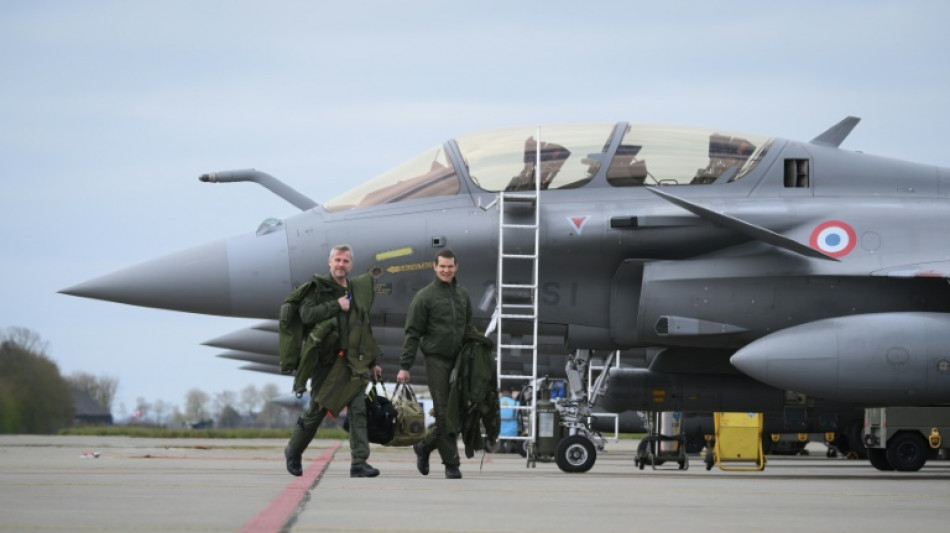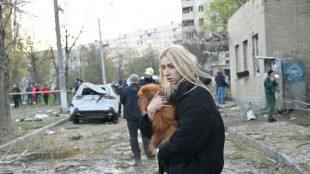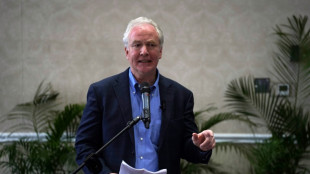
-
 SFWJ / Medcana Announces Strategic Expansion Into Australia With Acquisition of Cannabis Import and Distribution Licenses
SFWJ / Medcana Announces Strategic Expansion Into Australia With Acquisition of Cannabis Import and Distribution Licenses
-
Arsenal's Havertz could return for Champions League final

-
 US officials split on Ukraine truce prospects
US officials split on Ukraine truce prospects
-
Client brain-dead after Paris cryotherapy session goes wrong

-
 Flick demands answers from La Liga for 'joke' schedule
Flick demands answers from La Liga for 'joke' schedule
-
'Maddest game' sums up Man Utd career for Maguire

-
 Trial opens for students, journalists over Istanbul protests
Trial opens for students, journalists over Istanbul protests
-
Gaza rescuers say Israeli strikes kill 24 after Hamas rejects truce proposal

-
 'Really stuck': Ukraine's EU accession drive stumbles
'Really stuck': Ukraine's EU accession drive stumbles
-
'Not the time to discuss future', says Alonso amid Real Madrid links

-
 74 killed in deadliest US attack on Yemen, Huthis say
74 killed in deadliest US attack on Yemen, Huthis say
-
Southgate's ex-assistant Holland fired by Japan's Yokohama

-
 Vance meets Meloni in Rome before Easter at the Vatican
Vance meets Meloni in Rome before Easter at the Vatican
-
Ryan Gosling to star in new 'Star Wars' film

-
 Hamas calls for pressure to end Israel's aid block on Gaza
Hamas calls for pressure to end Israel's aid block on Gaza
-
Russia says Ukraine energy truce over, US mulls peace talks exit

-
 58 killed in deadliest US strike on Yemen, Huthis say
58 killed in deadliest US strike on Yemen, Huthis say
-
Museums rethink how the Holocaust should be shown

-
 Three dead after deadly spring storm wreaks havoc in the Alps
Three dead after deadly spring storm wreaks havoc in the Alps
-
No need for big changes at Liverpool, says Slot

-
 Bloody Philippine passion play sees final performance of veteran 'Jesus'
Bloody Philippine passion play sees final performance of veteran 'Jesus'
-
New US envoy prays, delivers Trump 'peace' message at Western Wall

-
 Postecoglou sticking around 'a little longer' as Spurs show fight in Frankfurt
Postecoglou sticking around 'a little longer' as Spurs show fight in Frankfurt
-
US threatens to withdraw from Ukraine talks if no progress

-
 Tears and defiance in Sumy as Russia batters Ukraine border city
Tears and defiance in Sumy as Russia batters Ukraine border city
-
Russia rains missiles on Ukraine as US mulls ending truce efforts

-
 Tokyo leads gains in most Asian markets on trade deal hopes
Tokyo leads gains in most Asian markets on trade deal hopes
-
Two missing after deadly spring snowstorm wreaks havoc in the Alps

-
 'War has taken everything': AFP reporter returns home to Khartoum
'War has taken everything': AFP reporter returns home to Khartoum
-
US strikes on Yemen fuel port kill 38, Huthis say

-
 Slegers targets Lyon scalp in pursuit of Arsenal European glory
Slegers targets Lyon scalp in pursuit of Arsenal European glory
-
'Defend ourselves': Refugee girls in Kenya find strength in taekwondo

-
 China's manufacturing backbone feels Trump trade war pinch
China's manufacturing backbone feels Trump trade war pinch
-
Sri Lankans throng to Kandy for rare display of Buddhist relic

-
 Chinese vent anger at Trump's trade war with memes, mockery
Chinese vent anger at Trump's trade war with memes, mockery
-
Heartbroken Brits abandon pets as living costs bite

-
 Mongolian LGBTQ youth fight for recognition through music, comedy
Mongolian LGBTQ youth fight for recognition through music, comedy
-
Cash crunch leaves Syrians queueing for hours to collect salaries

-
 Lyon left to regroup for Champions League bid after painful European exit
Lyon left to regroup for Champions League bid after painful European exit
-
Unravelling Real Madrid face Athletic Bilbao Liga test

-
 Napoli disturbing buoyant Inter's peace in Serie A Easter bonanza
Napoli disturbing buoyant Inter's peace in Serie A Easter bonanza
-
Disappointed Dortmund chase consistency with Europe at stake

-
 Asian markets mixed as traders track tariff talks
Asian markets mixed as traders track tariff talks
-
Yan and Buhai share lead at LA Championship

-
 Under fire at debate, Canada PM Carney tries to focus on Trump
Under fire at debate, Canada PM Carney tries to focus on Trump
-
Liverpool poised for Premier League coronation, Leicester, Ipswich for relegation

-
 India's elephant warning system tackles deadly conflict
India's elephant warning system tackles deadly conflict
-
US senator meets wrongfully deported Salvadoran migrant

-
 Gustavo Dudamel: the superstar conductor building bridges to pop
Gustavo Dudamel: the superstar conductor building bridges to pop
-
Japan rice prices soar as core inflation accelerates


In skies, as on land, European forces face gaps if US pulls back
Fighter jets from the United States, France, Finland and Germany roar into the skies from a Dutch base as part of NATO's biggest air exercise this year.
The aim: to practice stopping -- and then defeating -- an enemy attack against the alliance as Russia's war in Ukraine fuels fears in Europe.
But while NATO focuses on the menace from the east, another potential threat is looming from within the alliance.
Since returning to office, US President Donald Trump has sowed doubt over Washington's commitment to underpinning European security and his administration has warned it could move forces away from the continent to deal with challenges elsewhere like China.
For now, NATO commanders insist nothing has changed -- showcased by the latest drills.
"We recently elected a new president, and we're still trying to figure out the exact policies that they're going to be coming out with," General James Hecker, the top US and NATO air commander in Europe, told reporters during the exercises.
"I think you're going to see us hand in hand with the Europeans for quite some time."
But if Trump does decide to withdraw US forces, there are fears that could leave European militaries struggling to plug gaps in key areas as they race to face off against an emboldened Moscow.
While attention often centres on the roughly 100,000 US troops currently stationed on the continent, above them in the skies, commanders and experts point to multiple areas where Europe could struggle without Washington.
Those include air defences, spy planes and satellites, electronic systems that can jam radar, tankers to refuel jets mid-flight and hulking aircraft used to transport troops.
"Hypothetically, if the environment over Taiwan deteriorates, the US is going to look to move key assets" from Europe, said Douglas Barrie from the International Institute for Strategic Studies.
- 'Best equipment' -
European nations have hiked defence spending since Russia's 2022 full-scale invasion of Ukraine and are set to go even further, under pressure from Trump.
But while purchases of the latest US F-35 fighter jets have risen in recent years -- acquiring systems in which Europe lags will be costly and time-consuming.
"It would take three to five years for some systems, five to 10 years for others, depending on where you wanted to spend your money," Barrie said.
Not to mention assets such as satellite systems and strategic nuclear bombers that would take decades to replace -- if they can ever really be substituted.
Doubts over Trump's reliability have also fuelled questions about whether Europe should keep buying equipment from the United States.
Worries he could hobble F-35s by refusing software updates or spare parts have led several countries to reconsider purchases -- and prompted renewed calls from the likes of France to cut reliance on Washington.
"This is a real opportunity for Europe to question its own model and possibly its own dependencies," said French air force general Laurent Rataud.
But while equivalents for much of the equipment do exist in Europe, production times are often long and the continent doesn't yet produce a fifth-generation stealth jet like the F-35.
"It's of the utmost importance that my women and men have the best equipment," said Dutch air force chief Andre Steur.
"For me it's less relevant where that kit is built."
- 'No match' -
Despite gaps in their inventories, NATO's European members insist they'd be able to handle a fight for the skies against Russia -- even without the United States.
"We actually have some pretty strong air forces," Lieutenant Colonel Martin Friis, a Danish officer at NATO's air command, told AFP.
"Some of them maybe have gotten smaller, but the technology, the weapons and the training is, compared to what we see from at least one potential opponent -- they're no match."
During the Cold War, the NATO alliance believed it would have air dominance over the Soviet Union thanks to its technological superiority.
As the threat receded after the fall of Communism, air forces often downsized and readapted to new missions in places like Afghanistan, where their opponents lacked firepower.
NATO has closely watched how Moscow failed to gain air superiority in Ukraine against Kyiv's much smaller force, and learnt its lessons.
Commodore Marcel van Egmond, head of the Dutch air combat command, said he is confident that European countries would have the upper hand over Russia -- at least in the early days of any conflict.
"But we need help for the longer fight, maybe from the US," he told AFP.
"The long-term sustainment, in terms of capacity that we have, might be a challenge."
P.Silva--AMWN